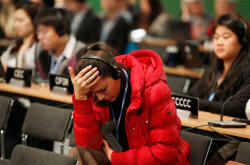 |
|


Climate
talks stalled over finance, carbon cuts
[November 23, 2013] WARSAW, Poland (AP) — The inability of more than 190 countries to agree on climate aid to developing countries and milestones for work on a new global warming pact has pushed U.N. climate talks into an extra day.
|
After all-night talks, a new draft agreement
emerged Saturday with vague guidelines on when countries should
present their carbon emissions targets for a larger deal that's
supposed to be adopted in Paris in 2015. Developing countries want to make sure that richer countries
adopt stricter targets than they do and have resisted a push by
the European Union and the U.S. for a clear timeline. The latest draft said countries should present their commitment
by the first quarter of 2015 if "in a position to do so." Negotiations were expected to continue into Saturday afternoon. "Climate negotiations are understandably tense because there is
still a perception that if one country wins the other loses,"
said Jake Schmidt of the Natural Resources Defense Council.
"That isn't true as countries clearly have a huge domestic
upside to action, but that perception still lingers." The U.N. climate talks were launched in 1992 after scientists
warned that humans were warming the planet by pumping CO2 and
other heat-trapping gases into the atmosphere, primarily through
the burning of fossil fuels. In Warsaw, negotiators were trying to lay the foundation of a
deal in 2015 that would take effect five years later, but were
bogged down by recurring disputes over who needs to do what,
when and how. Countries made progress on advancing a program to reduce
deforestation in developing countries, an important source of
emissions because trees absorb carbon dioxide. Climate financing proved harder to agree on. Rich countries have
promised to help developing nations make their economies greener
and to adapt to rising sea levels, desertification and other
climate impacts. They have provided billions of dollars in climate financing in
recent years, but have resisted calls to put down firm
commitments on how they're going to fulfill a pledge to scale up
annual contributions to $100 billion by 2020. "There is absolutely nothing to write home about at the moment,"
Fiji delegate Sai Navoti said, speaking on behalf of developing
countries. Pointing to the devastating impact of Typhoon Haiyan in the
Philippines, island nations also demanded a new "loss and damage
mechanism" to help them deal with weather disasters made worse
by climate change. Rich countries were seeking a compromise that
would not make them liable for damage caused by extreme weather
events. Associated Press writer Monika Scislowska contributed to this report. Karl Ritter can be reached at https://twitter.com/Karl_Ritter. Copyright 2013 The Associated Press. All rights reserved. This material may not be published, broadcast, rewritten or redistributed.
|


